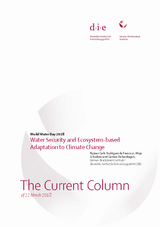World Water Day 2018
Water Security and Ecosystem-based Adaptation to Climate Change
Rodríguez de Francisco, Jean Carlo / Mirja Schoderer / Carmen RicherzhagenThe Current Column (2018)
Bonn: German Development Institute / Deutsches Institut für Entwicklungspolitik (DIE), The Current Column of 22 March 2018
Bonn, 22 March 2018. The motto of this year’s World Water Day states “the answer is in nature”, referring to nature-based solutions to the “water challenges we face in the 21st century”. One of these challenges is climate change, the impacts of which threaten water security worldwide. About 1.9 billion people already face water scarcity today, a number that is projected to increase to 3 billion people by 2050, according to OECD estimates. These estimates also indicate that by 2050, nearly 20 percent of the world’s population will be at risk from floods. According to the World Economic and Social Survey, poor and marginalized groups are likely to experience the worst impacts of water shortages and flood hazards, as they tend to live in highly risk-prone areas and lack the funds to prepare for drought or flood scenarios. Thereby, climatic change stands to worsen existing inequalities, disproportionately threatening the water security and thus the development and well-being of already disadvantaged groups. Ecosystems deliver a variety of water-related benefits to people. Next to recreational opportunities, they provide fish, timber, fruit, and a variety of other products, as well as water for agriculture, industry, drinking and hygiene. Additionally, ecosystems and their services can help people to cope with the impacts of climate change. For example, Andean highland ecosystems (paramos) capture and retain water, serving as a flood buffer in the rainy season and a balanced source of water in the dry season. Coastal mangroves and wetlands reduce the impact of flooding or gales on human communities. Considering the importance of ecosystem services for human wellbeing, many development and environmental agencies have turned towards promoting ecosystem-based adaptation strategies to confront the threat to water security and to help people adapt to the adverse effects of climate change. The well-being of all humans is at the center of both, ecosystem-based adaptation and water security measures. However, existing inequalities tend to influence to what extent population groups are able to benefit from ecosystem services and how water resources as well as water-related risks are distributed. As a reality check, it is thus necessary to evaluate efforts that promote water security and ecosystem-based adaptation against the background of growing inequality in the world. For example, the use of water by a peasant community upstream (e.g. irrigation) may be at odds with the water security of a cut-flower company or a water company located further downstream as water may not be sufficient for all uses during the dry season or because agriculture upstream may change water quality. Thus, water security for some actors may entail water insecurity for others and political and economic power play an important role in determining whose water security prevails. Many ecosystem-based adaptation projects are implemented in local communities at a relatively small or pilot scale. Yet, next to these communities, powerful economic actors (i.e. large-scale cattle ranchers, real estate developers) pursue activities that frequently reduce the adaptive capacities of communities, for example by draining wetlands or cutting down trees, which increases the risk of floods. Most ecosystem-based adaptation projects entail better environmental protection, meaning reduced access by communities to some ecosystem goods and services (e.g. less irrigation water, less wood, land use restrictions) and increased time-demand to keep up adaptative measures (e.g. living hedgerows, planting mangroves). Meanwhile, powerful economic actors tend to circumvent environmental protection laws with the use of political power, usually carrying on with destructive practices towards ecosystems. In that sense, the success of ecosystem-based adaptation not only depends on the efforts made by the communities themselves but also on environmental law enforcement and on the degree of responsibility that powerful economic agents are willing to adopt for these shared-ecosystems. Ecosystem-based adaptation strategies offer an opportunity to enhance water security, climate-resilient livelihoods, and social cohesion simultaneously, while also benefiting natural systems. Thus, the potential of nature-based solutions is vast. So, however, is the dual challenge posed by the impacts of climatic changes on water security and the socio-economic inequalities that leave a rising number of people vulnerable. To ensure that they reach those who are most in need of assistance, interventions need to be sensitive to issues of social differentiation, careful about potential impacts on the social structure of the targeted communities, and honest about the lasting climate change adaptation that they can affect. Only in this manner can they lead to the realization of true win-win outcomes.



